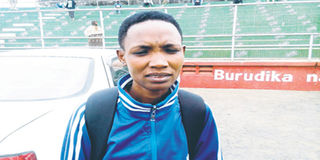Challenging moments for Team Tanzania coach

Our only female marathon envoy: Sarah Ramadhani after a training session at the Sheikh Amri Abeid Stadium in Arusha recently. PHOTO | YOHANA CHALLE
What you need to know:
Although the Games will formally kick off today (Friday) in the Brazilian city of Rio de Janeiro with the grand opening in one of its major stadiums, his trainees have about two more weeks to train for the competition.
Arusha. Francis John, an athletic coach for Team Tanzania to the Rio Olympics, is not somebody who would entertain laissez-faire or tall stories when in serious business.
Armed with a stop-watch and a whistle, he would stick to seeing his athletes do the right exercises under his firm instructions in preparation for the Games kicking off this afternoon.
His conditions; people should keep off the running track and would not invite any discussions when coaching except from those in his technical bench.
Although the Games will formally kick off today (Friday) in the Brazilian city of Rio de Janeiro with the grand opening in one of its major stadiums, his trainees have about two more weeks to train for the competition.
“We are in the final stages of training ready for the competition," he told The Citizen at the end of one training sessions at Arusha’s Sheikh Amri Abeid Stadium last weekend.
“All of them are marathoners and will leave for Rio on different dates”, he said, adding that the squad’s training at the high-altitude West Kilimanjaro and Arusha would continue till the departure dates.
John, a 61 year old athletics coach may not be proud of having only four runners in his training camp in a country which has a history of having many runners in international and regional competitions.
But he is proud of his record. Some of the athletic teams he coached in the past have brought honours to the country, including gold medals and would not regret to see a repeat of that feat in Brazil.
“Participation of athletes in the Olympics means one has qualified. These are the only ones who have qualified like any other from other countries, so we pin our hopes on them,” he said during a break after nearly two hours of exercises under the chilly weather.
He added that the training had involved scores of other runners but could not be absorbed into Team Tanzania since they had not performed within the Olympics qualifying marks.
Incidentally all of them are marathoners, training for the 42 kilometre race normally held at the closing stages of the Games.
John banks his hopes on the determination shown by the athletes but more so with improvements they have shown since they entered into a training camp six months ago.
Of course, he is aware when lady luck smiles for Tanzania in the Olympics, the Commonwealth, All Africa Games and other international athletic competitions, the country would fare well in long distance running.
The marathon and 10,000 metre races do not have the elimination rounds like in other races. Even in their hundreds, all the competitors would take it on.
The 42 km run, and to some extent 10m run, has its special significance and attention because it normally is the last sport during the Olympic Games.
An athlete winning the race takes top honours to his or her country given the fact that the marathon grasps the attention of the world viewers.
Tanzania has not won a marathon in the Olympics but has not failed to send a marathoner in the 12 Olympic Games competitions it has participated after independence.
John Steven Akhwari captured the world headlines after finishing the race in injuries during the Mexico Games in 1968.
However, the country has won great honours from the marathoners in the Commonwealth and All Africa Games, demonstrating how the 42 km race can end frustrations and bring fortune for countries overshadowed by athletics giants.
Gidamis Shahanga was literally not known at national level when he went to the Commonwealth Games in Edmonton, Canada in 1978 to win the country gold in marathon.
He grabbed another gold medal (in 10,000m) during the similar games which followed in Brisbane, Australia four years later.
Claver Kamanya, Suleiman Nyambui, Francis Naali and Juma Ikangaa are among the great long distance runners who represented the country well in long distance races.
The Commonwealth Games have particularly proved platform for medal harvests for Tanzania, especially the prestigious gold; Filbert Bayi (1,500m) in Christchurch, New Zealand in 1974, Gidamis Shahanga (1978) and Francis Naali (2002).
For coach John, drilling Team Tanzania athletics squad for the Rio Olympics will be a continuation of his coaching career which has seen him training national athletes for various international track and field competitions.
He was the coach for the athletic team which represented the country in the 2004 Olympics in Athens, Greece, the home of the Olympic movement.
Prior to that he coached another squad for Tanzania which participated in the Commonwealth Games of 2002 in Scotland in which Francis Naali won a gold medal and one John Yuda a bronze.
In 2003 he led the country’s athletic team to the All Africa Games in Abuja, Nigeria where one Mwera won the country a gold medal in the 800m run and bronze from another national sprinter.
He did the same for the World Athletics Games in Helsinki, Finland in 2005 where Tanzania bagged a silver in marathon. He was born in Karatu in 1955 and was in the country’s athletic teams as a competitor for much of 1970s and 1980s.




